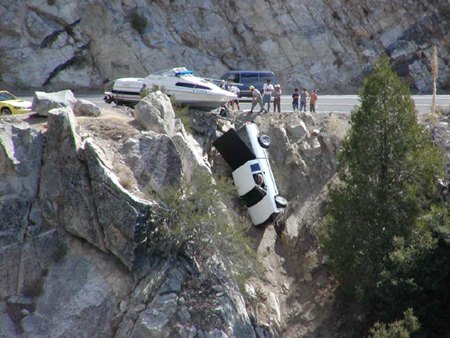Bailout Watch 343: CAR Says GM's Recovery Plan Sucks
You remember The Center for Automotive Research (CAR). They’re the Detroit-based automaker and union-funded think tank that progated the “soup lines beckon if you don’t bailout Detroit” study. The mainstream media repeated CAR’s stats– debunked on TTAC by both myself and our Best and Brightest— as gospel. Now that CAR has had its wicked way with $17.4b of your tax money, they’re back from hiatus with fresh apocalyptic visions for policy makers. Only this time, they’re right. “McAlinden, director-economics research for the Center for Automotive Research, predicts auto makers will sell 11.5 million units in 2009, down from 13.2 million last year and 16.2 million in 2007,” Ward’s Dealer Business reports. ‘The U.S. will not see 14 million new-vehicle sales again until 2012 and 16 million in 2013. The downturn will last a long time.'” OK, so… “Whether the two auto makers can meet the loan requirements set by the Bush Admin. remains to be seen. However he does not believe GM can meet the obligations as they are written now, adding, the ‘conditions will be changed so GM can keep them.'” Make no mistake: McAlinden has no faith in GM’s recovery plans.
“McAlinden also argues GM’s restructuring plan submitted to Congress in December does not go far enough, assuming a worst-case scenario of 12.5 million units annually. In addition to dropping the Saab, Hummer, Pontiac and possibly Saturn brands, GM needs to kill Buick. That will get the auto maker down to 20 nameplates by 2012, not the 40 called for in its strategic plan.
“While GM says it will reduce its dealer count from 6,450 to 4,700 by 2012, McAlinden says the auto maker only needs 1,500 dealerships selling 1,500 vehicles per location by 2012, far more than the average 440 vehicles GM dealers are selling today. Additionally, GM only needs to cut its employee ranks to 60,000, rather than the 65,000-75,000 announced in the plan.”
More by Robert Farago
Latest Car Reviews
Read moreLatest Product Reviews
Read moreRecent Comments
- Kwik_Shift_Pro4X Mazda CX-5 all the way.
- Spookiness The Mazda interior really is nice. I recognize the rationale for the Mazda infotainment interface design in lieu of a touch screen, but the filthy masses have spoken. As with the rotary engine, it's time to move on. To sell more cars they'll need to have touchscreens. Other carmakers have evolved beyond the iPad-screwed-on-top-the-dash look, so I'm sure Mazda can come up with something aesthetically pleasing and user-friendly. (Another quibble: I really don't need or want AWD, so I wish it wasn't forced. But again, the masses have spoken.)
- Lou_BC “We are always listening to the customer. "You sayin' the baller/gangsta types don't want Escalades on 24's that don't make vroom vroom rumbly sounds?
- AZFelix I shall fully endorse the use of autonomous cars on public roads once they have successfully completed my proposed Turing test for self driving vehicles. This test requires the successful completion of an at fault incident and accident free 24/7 driving session in Buffalo and upstate New York from October 1st until March 31st, and throughout the city of Jakarta, Indonesia for one consecutive year. Only Level 1 and Level 5 vehicles are permissible.
- Lou_BC I'd go Rav4. No Mazda dealer in my town and from what I've seen, Mazda's tend to rust.


































Comments
Join the conversation
CAR now has credibility because they are critical of GM? At the NAIAS I asked both Dave Cole and Kathy Watson of CAR about TTAC's criticism of their funding from industry sources and they said that less than 10% of their funding comes from automakers, the UAW and suppliers. Okay, so maybe I was swayed because Kathy's cute, but just about every major university gets funding from businesses without credibility issues. Apparently the automaker that currently gives the University of Michigan (where Cole was a long time and respected engineering professor) the most money is Toyota. I was at a meeting yesterday in Detroit with the CAR people. Gotta say that the group is not quite as party-line-driven as you’d think. Sean (McAlinden) is usually pretty straight-up on his analysis of the industry and several staff members have been brutal in the past with their comments regarding detroit’s current product. You can say the same about DeLorenzo and McElroy, but that doesn't keep some folks from calling them Detroit cheerleaders and fanboys because they don't want to see their neighbors in soup lines. McElroy got a huge laugh when I asked him how it feels to be called those names in light of how critical he's been of the domestic industry. Saying that CAR is "Detroit based" not only implies that they are linked to the domestic automakers, but it's inaccurate. CAR is based in Ann Arbor. If CAR is based in Detroit, than you could say the same about Toyota's North American research efforts.
Why aren't people buying cars? It seems to be a worldwide phenomenon. Does this normally happen in a recession? Have you seen any surveys as to the reasons why people, across all makers and across all countries, are not buying as many cars? I have always thought that it was that many normal buyers just cannot get any more credit, now that credit is tighter. If so, that means that sales will be off for a while -- maybe permanently -- because a bubble has burst. If, on the other hand, people are just delaying purchases until the economy goes from crisis to something still bad but at least stable, there will be some pent-up demand, and numbers will start going up again. No one knows for sure, I'm sure, but I wonder if anyone has seen any opinion on that.